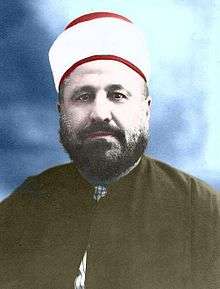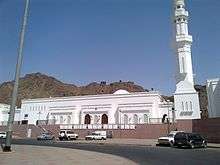Rashid Rida
Muhammad Rashid Rida (Arabic: محمد رشيد رضا, romanized: Muḥammad Rashīd Riḍā; 23 September 1865[1] or 18 October 1865[2] – 22 August 1935)[2] was an early Islamic reformer, whose ideas would later influence 20th-century Islamist thinkers in developing a political philosophy of an "Islamic state".[8] Rida is said to have been one of the most influential and controversial scholars of his generation[9] and was deeply influenced by the early Salafi Movement and the movement for Islamic Modernism founded in Cairo by Muhammad Abduh.[10][11]
Muhammad Rashid Rida | |
|---|---|
محمد رشید رضا | |
 Rashid Rida | |
| Personal | |
| Born | 23 September 1865[1] or 17 October 1865[2] |
| Died | 22 August 1935 (aged 69)[2] |
| Religion | Islam |
| Nationality | Ottoman, Egyptian |
| Movement | Modernism (Salafiyyah)[3][4][5][6] |
| Notable work(s) | Tafsir al-Manar |
| Muslim leader | |
Influenced by
| |
Influenced
| |
Rida was born near Tripoli in Al-Qalamoun. His early education consisted of training in "traditional Islamic subjects". In 1884–5 he was first exposed to al-`Urwa al-wuthqa, the journal of Jamal al-Din al-Afghani and Muhammad Abduh. In 1897 he left Syria for Cairo to collaborate with Abduh. The following year Rida launched al-Manar, a weekly and then monthly journal comprising Quranic commentary[12] at which he worked until his death in 1935, gradually distancing himself from the teachings of Abduh and adopting the methodology of the Salaf.[13]
Ideas
Rashid Rida, was a leading exponent of Salafism [14] and was especially critical of what he termed "blind following" of traditional Islam. He encouraged both laymen and scholars to interpret the primary sources of Islam themselves.[15] Applying this principle enabled Rida to tackle a number of subjects in a modern way and sometimes led to him holding unorthodox ideas that were considered controversial by some and progressive by others.
One of his controversial views was his support of Darwin's theory of evolution.[16] To justify Darwinism, Rida considered it permissible to "interpret certain stories of the Qur'an in an allegorical manner, as, for example, the story of Adam.".[17] He also believed that the origin of the human race from Adam is a history derived from the Hebrews and that Muslims are not obliged to believe in this account.[18]
Other controversial beliefs held by Rida included:
- His view that usury (riba) may be permitted in certain cases [19]
- His idea that building statues is permissible in Islam as long as there is no danger of their being devoted to improper religious uses.[20]
- His support of the British against the Ottomans [21]
- His view that "the minute living bodies which today have been made known by the microscope and are called microbes, may possibly be a species of Jinn"[22]
Rida focused on the relative weakness of Muslim societies vis-à-vis Western colonialism, blaming Sufi excesses, the blind imitation of the past (taqlid), the stagnation of the ulama, and the resulting failure to achieve progress in science and technology. He held that these flaws could be alleviated by a return to what he saw as the true principles of Islam albeit interpreted (ijtihad) to suit modern realities.[23] This alone could, he believed, save Muslims from subordination to the colonial powers.[24]
Rida had a close relationship with Freemasonry,[25] though his feelings toward the Bahá'í Faith were quite negative.[26]
Despite some controversial ideas held by Rida, his works and in particular his magazine al-Manar spread throughout the Muslim world influencing many individuals including the popular Salafi writer Muhammad Nasiruddin al-Albani.[27]
Muhammad Rashid Rida was one of the earliest critics of Zionism and wrote an article on the Movement as early as 1898.[28]
Rida died on his way back to Cairo from Suez, where he had gone to see off his patron, King of Saudi Arabia Abdulaziz Ibn Saud.[29]
Contributions to Islamist political thought
| Part of a series on:
Salafi movement |
|---|
 Sab'u Masajid, Saudi Arabia |
|
Ideology and influences |
|
Founders and key figures |
|
Notable universities |
|
|
|
The corruption and tyranny of Muslim rulers ("caliphs", sultans, etc.) throughout history was a central theme in Rida's criticisms. Rida, however, celebrated the rule of Muhammad and the Rightly Guided Caliphs, and leveled his attacks at subsequent rulers who could not maintain Muhammad's example. He also criticized the clergy ("ulama") for compromising their integrity - and the integrity of the Islamic law ("sharia") they were meant to uphold - by associating with worldly corrupt powers.[30]
Rida's ideas were foundational to the development of the modern "Islamic state". He "was an important link between classical theories of the caliphate, such as al-Mawardi's, and 20th-century notions of the Islamic state".[31]
Rida promoted a restoration or rejuvenation of the Caliphate for Islamic unity, and "democratic consultation on the part of the government, which he called "shura"."[23] In theology, his reformist ideas, like those of Abduh, were "based on the argument that:
shari'a consists of `ibadat (worship) and mu'amalat (social relations). Human reason has little scope in the former and Muslims should adhere to the dictates of the Qur'an and hadith. The laws governing mu'amalat should conform to Islamic ethics but on specific points may be continually reassessed according to changing conditions of different generations and societies.[12]
Although he did not call for the revolutionary establishment of an Islamic state, rather advocating only gradual reform of the existing Ottoman government, Rida preceded Abul Ala Maududi, Sayyid Qutb, and later Islamists in declaring adherence to Sharia law as essential for Islam and Muslims, saying
Koran 5:44 applies to `...whomsoever thinks it distasteful to rule in accordance with the just rules which God sent down, and does not rule by them because he has different views, or because he has worldly interests. According to these verses, they are unbelievers; because true faith requires obedience. Obedience requires deeds, and is not consistent with omission'[32]
See also
- List of Islamic scholars
References
- Ende, W. (2012). "Ras̲h̲īd Riḍā". In P. Bearman; Th. Bianquis; C.E. Bosworth; E. van Donzel; W.P. Heinrichs (eds.). Encyclopaedia of Islam (2nd ed.). Brill. doi:10.1163/1573-3912_islam_SIM_6240.
- Arthur Goldschmidt (2000). Biographical Dictionary of Modern Egypt. Lynne Rienner Publishers. p. 166. ISBN 9781555872298.
- Wood, Simon A. Christian criticisms, Islamic proofs: Rashid Rida's modernist defence of Islam. Simon and Schuster, 2012.
- Kerr, Malcolm H. "Islamic reform: The political and legal theories of Muhammad'Abduh and Rashid Rida." (1966).
- David Gauvain, Salafi Ritual Purity: In the Presence of God, p33
- Brown, Johnathon (14 December 2009). "Salafism, Modernist Salafism from the 20th Century to the Present". Oxford Bibliographies. Retrieved 19 June 2020.
- "He began to specialize in the field of Hadith and its related sciences by the age of 20 -- being influenced by articles in Al-Manar magazine." Prophet's Prayer (Sallallaahu 'Alaihi Wasallam) Described from the Beginning to the End as Though You See it, introduction, p4.
- Ayubi, Nazih N.; Hashemi, Nader; Qureshi, Emran (2009). "Islamic State". In John L. Esposito (ed.). The Oxford Encyclopedia of the Islamic World. Oxford: Oxford University Press.CS1 maint: ref=harv (link)
- Encyclopedia of Islam and the Muslim World, Thompson Gale (2004), p.597
- Encyclopedia of Islam, Juan Campo, p. 581
- http://world-news-research.com/21sept2012.html
- Encyclopedia of Islam and the Muslim World, Thompson Gale (2004), p.597
- Ana Belén Soage, "Rashid Rida's Legacy". The Muslim World 98/1 (Jan. 2008), pp. 1-23.
- Daniel Ungureanu, Wahhabism, Salafism and the Expansion of Islamic Fundamentalist Ideology, p146.
- Rashid Rida, al-Manar, vol 8. No. 731, 732
- Rashid Rida, "Nazariyat Darwin wa al-Islam", al-Manar, vol 30. no. 8, March 1930, 593 - 600
- Charles C. Adams, Islam and Modernism in Egypt, p.187. Also, Rashid Rida, al-Manar, vol 8. no. 581, 582.
- Rashid Rida, al-Manar, vol 7, no. 483.
- Rida stated that "usury may be permitted in cases of necessity (darurah)" John Stuart Mill, Principles of Political Economy, (1848, first edition), London, 1909, p. 926
- Charles C. Adams, Islam and Modernism in Egypt, p.194. Also, Rashid Rida, al-Manar, vol 4, no 56
- Hasan Kayali, Arabs and Young Turks, Ottomanism, Arabism and Islamism in the Ottoman Empire 1908-1918, Berkeley, CA, 1997, p. 185
- Rashid Rida, Al-Manar, vol 4. No 334, 335
- Glasse, Cyril, The New Encyclopedia of Islam, Altamira Press, 2001, p.384
- Emmanuel Sivan, Radical Islam: Medieval Theology and Modern Politics, enl. Ed. (New Have: Yale University Press, 1990), p.101
- Karim Wissa, “Freemasonry in Egypt 1798-1921″. The British Society for Middle Eastern Studies Bulletin, vol.16, no.2, 1989
- Juan Cole, Muhammad `Abduh and Rashid Rida - A Dialogue on the Baha'i Faith. World Order (journal), vol. 15, nos. 3-4 (Spring/Summer 1981): pp. 7-16.
- Richard Gauvain, Salafi Ritual Purity: In the Presence of God, Introduction, p.9. Prophet's Prayer (Sallallaahu 'Alaihi Wasallam) Described from the Beginning to the End as Though You See it, introduction, p4. "He began to specialize in the field of Hadith and its related sciences by the age of 20 -- being influenced by articles in Al-Manar magazine."
- Beška, Emanuel: RESPONSES OF PROMINENT ARABS TOWARDS ZIONIST ASPIRATIONS AND COLONIZATION PRIOR TO 1908. In Asian and African Studies, 16, 1, 2007.
- Soage, "Rashid Rida's Legacy", p. 2.
- Rida, Muhammad Rashid. 1934. Al-Khilafa aw al-Imama al-Uzma [The caliphate or the great imamate]. Cairo: Matba'at al-Manar bi-Misr, p. 57-65.
- Eickelman, D. F., & Piscatori, J. (1996). Muslim politics. Princeton: Princeton University Press, p. 31.
- Rida, Muhammad Rashid, Tafsir al Manar, VI, p.330
External links
| Arabic Wikisource has original text related to this article: |